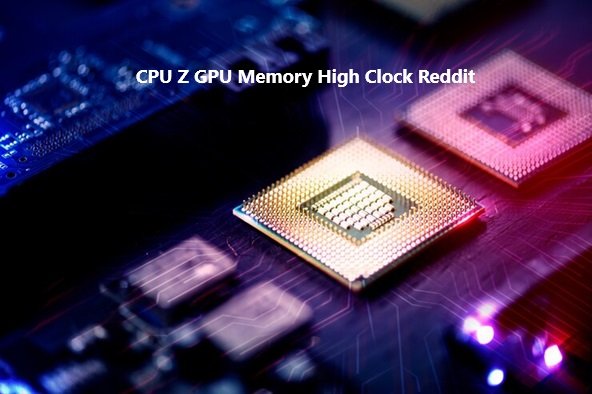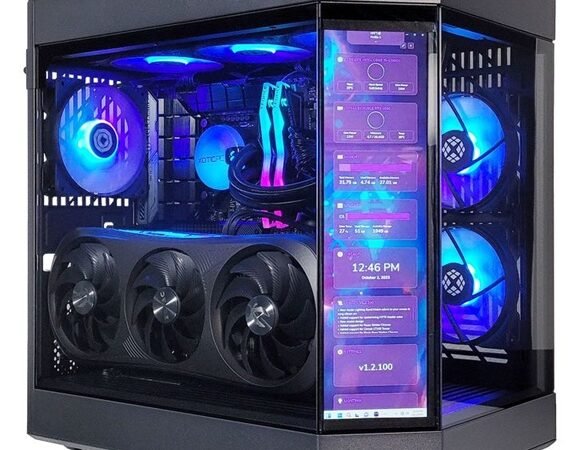CPU Z GPU Memory High Clock Reddit: What You Need to Know

Introduction
If you’ve been monitoring your GPU with CPU-Z or other hardware monitoring tools, you might notice that your GPU memory clock appears unusually high. This is a common topic on Reddit, where users share their experiences and solutions related to CPU Z GPU Memory High Clock Reddit, especially during idle periods or when gaming.
In this article, we’ll explain what a GPU memory clock is, why it sometimes runs higher than expected, and how Reddit users approach this issue. We’ll also cover how to use CPU-Z to monitor your GPU memory clock, when high clocks are concerning, and how to reduce them if necessary.
What is CPU Z GPU Memory High Clock Reddit?
CPU-Z is a popular freeware tool used to monitor and report on system hardware, including the CPU, motherboard, RAM, and GPU. For GPU-specific information, CPU-Z offers details on core clock speeds, memory type, memory clock speeds, and other relevant data. While it’s primarily known for its CPU reporting, CPU-Z’s GPU tab provides essential information about your graphics card’s performance.
Overview of CPU-Z’s GPU Monitoring Capabilities
- Core Clock Speed: The GPU’s operational speed in MHz. It directly impacts the processing power of your graphics card.
- Memory Clock: The speed at which your GPU’s VRAM (video memory) operates, also measured in MHz. This affects how quickly data is transferred between the GPU and its memory, influencing overall performance, especially in high-resolution or graphically demanding tasks.
- GPU Load: Displays the percentage of the GPU currently in use.
- Temperature and Voltages: Basic thermal monitoring and power information for your GPU.
CPU-Z helps users identify potential performance bottlenecks or abnormal behavior, such as high memory clocks, which may lead to overheating or excessive power consumption.
Understanding GPU Memory Clock
The GPU memory clock is a critical component of your graphics card’s performance. It refers to the speed at which the memory (VRAM) on your graphics card operates. Just like your CPU and GPU core clocks, the memory clock influences the overall performance of your system, especially in tasks like gaming, video editing, and 3D rendering.
What is a Memory Clock?
The memory clock defines how fast your graphics card can transfer data between its memory and the GPU. A higher memory clock typically allows for faster data processing, which can result in smoother frame rates and better overall performance in graphically intensive applications.
Importance of Memory Clock Speed for GPUs
- Performance in Games: A high memory clock ensures faster texture loading and improved performance in memory-intensive tasks, like high-resolution gaming or running VR applications.
- Rendering and Video Editing: For professionals working with large files or detailed video footage, a high memory clock can significantly reduce render times.
- Multi-Monitor Setups: Higher memory clocks can help manage the increased data demand when using multiple displays at high resolutions.
Why is My GPU Memory Clock High?
It’s common for Reddit users to post about unexpectedly high GPU memory clocks, especially in situations where they aren’t running any demanding applications. Several reasons could explain why your memory clock remains high:
Common Reasons for High Memory Clocks
- Background Applications: Even simple apps like browsers or video players can sometimes engage the GPU, causing the memory clock to rise.
- High Refresh Rate Monitors: If you’re using a monitor with a refresh rate above 60Hz (like 144Hz or 240Hz), your GPU may run at higher memory clocks to maintain smooth performance.
- Poor Power Management Settings: Some GPUs are configured to stay at higher memory clocks even when idle, due to power management settings or inefficient software profiles.
- Driver Issues: Outdated or poorly optimized drivers can cause the memory clock to remain high even when the system is not under load.
- Overclocking Profiles: If you’ve manually overclocked your GPU or applied an aggressive factory overclock, the memory clock may be permanently set higher than the default configuration.
How to Check GPU Memory Clocks with CPU-Z
If you’re experiencing high memory clocks, the first step is to confirm this by using a tool like CPU-Z. Here’s how you can easily check your GPU memory clock:
Step-by-Step Guide for Beginners
- Download and Install CPU-Z: Head over to the official website of CPU-Z and download the latest version.
- Launch the Program: Open CPU-Z and navigate to the “Graphics” tab, where you’ll see detailed information about your GPU, including core and memory clock speeds.
- Monitor the Clock: Check the “Memory Clock” field to see the current speed. You may notice fluctuations depending on whether your system is idle or under load.
- Compare with Manufacturer Specifications: If the clock speed is significantly higher than what the manufacturer lists, this could indicate a configuration or software issue.
By regularly monitoring your GPU memory clock, you can keep track of any abnormalities and prevent performance issues.
What Reddit Says About High GPU Memory Clocks
Reddit, especially in communities like r/techsupport and r/nvidia, is full of discussions about high GPU memory clocks. Users often seek advice from the community about whether these high clocks are normal or if they indicate a deeper issue with their system.
Key Discussions and Insights from Reddit Threads
- Idle High Clocks: Many users on Reddit report seeing high memory clocks when their PC is idle. Responses often suggest that this is common in systems with multiple high-refresh-rate monitors or when background processes are utilizing the GPU.
- Driver Updates: A frequently recommended solution is ensuring that you have the latest GPU drivers installed, as some driver versions contain fixes for power management and idle clock issues.
- Power Management Settings: Adjusting your GPU’s power management mode in the NVIDIA Control Panel or AMD Radeon Software is a common suggestion to force lower clocks when not gaming.
- Reducing Refresh Rates: Users often advise reducing the refresh rate of your monitor(s) when not gaming to see if this lowers memory clocks.
Should You Be Concerned About High GPU Memory Clocks?
In many cases, high memory clocks aren’t something to worry about, particularly if your system is stable and you’re not experiencing performance issues. However, in some cases, high memory clocks can indicate a problem, especially if accompanied by high temperatures or excessive power consumption.
Normal vs. Concerning Scenarios
- Normal: High memory clocks during gaming, rendering, or using multiple monitors with high refresh rates.
- Concerning: Consistently high memory clocks when your system is idle, causing overheating or power inefficiency.
How to Lower GPU Memory Clocks
If you’ve determined that your GPU memory clock is consistently running high and you want to lower it, there are several methods to adjust or manage the memory clock. Reducing the memory clock can help reduce heat output, power consumption, and extend the lifespan of your graphics card, especially if it’s running unnecessarily high when idle.
Methods for Adjusting or Lowering Memory Clocks
- Using Manufacturer-Specific Software: Most GPU manufacturers provide software tools for managing and overclocking their graphics cards. These tools can be used to underclock or manually adjust the memory clock.
- For NVIDIA GPUs: Use NVIDIA Control Panel or MSI Afterburner. MSI Afterburner is a popular utility that allows you to adjust the core and memory clocks of your GPU. After installing the software, you can decrease the memory clock using a slider.
- For AMD GPUs: AMD’s Radeon Software allows users to adjust their GPU’s performance, including the memory clock. Navigate to the “Performance” tab, then select “Tuning” to modify the clock settings.
- Lowering the Refresh Rate of Your Monitors: If your high memory clock is tied to using a high-refresh-rate monitor (such as 144Hz or higher), try reducing the refresh rate when performing tasks that don’t require such high performance, like web browsing or document editing. This can be done through the display settings in Windows or in your GPU control panel.
- Adjusting Power Management Settings: In the NVIDIA Control Panel or AMD Radeon Software, you can set your power mode to “Optimal Power” or “Power Saver” to prevent the GPU from running at full clock speeds when idle or during less demanding tasks.
- NVIDIA Control Panel: Go to “Manage 3D Settings” → “Power Management Mode” → select Optimal Power.
- AMD Radeon Software: Navigate to “Settings” → “Graphics” → and select Power Efficiency.
- Using Third-Party Tools: Tools like MSI Afterburner and EVGA Precision X1 allow you to fine-tune the performance of your GPU, including both core and memory clocks. These tools are especially useful if you want to underclock your GPU manually.
- BIOS Settings: For more advanced users, modifying your GPU’s BIOS can allow you to lock the memory clock at a lower setting, but this approach is risky and could void your warranty. Always ensure you have a backup of the original BIOS before making changes.
- Disabling Unnecessary Background Applications: Sometimes, high memory clocks can be caused by background apps that unnecessarily engage the GPU. Check for any running applications that might be using the GPU (such as browsers with hardware acceleration enabled or media players) and close them to reduce memory clock usage.
By following these steps, you can effectively lower your GPU memory clock to reduce power consumption and heat without sacrificing significant performance.
The Impact of High GPU Memory Clocks on Gaming and Performance
One of the biggest questions for gamers and PC enthusiasts is whether high GPU memory clocks affect gaming performance. The answer largely depends on your specific use case and whether the clocks are running high during idle or load conditions.
How It Affects Gaming, Rendering, and Overclocking
- Gaming Performance: In gaming, a high GPU memory clock can be beneficial, especially in modern titles with large textures and complex scenes. More memory bandwidth allows for quicker data transfer, which helps avoid bottlenecks in texture loading and improves frame rates. For example, games that run at 1440p or 4K resolutions can see performance gains with a higher memory clock.
- Rendering and 3D Work: For creative professionals who use their GPU for tasks like video editing, 3D rendering, or CAD, a high memory clock helps process large files more efficiently. When rendering scenes with complex textures and lighting, more memory bandwidth helps the GPU manage data faster, which leads to shorter render times.
- Overclocking: If you’re overclocking your GPU to squeeze out extra performance, increasing the memory clock is typically one of the first steps. A higher memory clock can improve overall performance, but it comes at the cost of higher power consumption and temperatures, which is why managing these values is critical.
However, if your memory clock is running high while the system is idle, this could increase your power consumption and wear down your GPU unnecessarily. In such cases, lowering the memory clock during idle times won’t affect performance but can benefit the longevity and efficiency of your system.
Thermal Concerns and Power Draw
CPU Z GPU Memory High Clock Reddit, especially when sustained over long periods, can have a noticeable impact on your system’s thermals and power draw. This is why many Reddit users express concerns over high clocks, particularly during idle or light usage.
High Memory Clocks and Their Effect on Temperatures and Power Consumption
- Temperatures: Running your GPU at a high memory clock can cause an increase in heat generation, especially if your card is not properly cooled. GPUs rely on both core and memory clocks for performance, and an overclocked memory chip will naturally produce more heat. If your system isn’t well-ventilated, this could lead to thermal throttling, where the GPU reduces its performance to prevent overheating.
- Power Consumption: A higher memory clock also increases the power consumption of your GPU, which might not be noticeable for short bursts of gaming but can add up over time. For users who run their PCs for extended periods, this can contribute to higher electricity costs. Moreover, high power consumption often results in the GPU’s fans spinning faster to dissipate heat, which can cause more noise.
To mitigate these issues, many Reddit users suggest monitoring temperatures using software like HWMonitor or CPU Z GPU Memory High Clock Reddit, which can give you a real-time look at how your memory clock is affecting overall temperatures and power draw.
Understanding Dynamic Memory Clock Behavior (Idle vs. Load)
One of the reasons many users see high GPU memory clocks when they aren’t doing anything intensive is due to dynamic clocking. Modern GPUs are designed to adjust clock speeds based on load, which means they should downclock (reduce speed) when idle and boost clocks when under heavy load, like gaming or video editing.
How and Why Clocks Vary in Different Scenarios
- Idle vs. Load: When your system is idle or performing light tasks (like browsing the web), your GPU’s memory clock should theoretically lower to save power. However, many users on Reddit report their clocks staying high, which could be due to power settings, driver issues, or background applications.
- High Refresh Rate Monitors: Another factor that keeps the memory clock high is the use of high-refresh-rate monitors. If you’re running a monitor at 144Hz or higher, your GPU may maintain a higher clock to ensure smooth performance, even if the workload is light.
By understanding how your GPU dynamically manages its memory clock, you can better diagnose issues where clocks remain high when they shouldn’t be.
BIOS and Driver Solutions to High Memory Clock Issues
Many memory clock issues can be fixed through simple software updates or BIOS adjustments. Updating your GPU’s drivers and ensuring your motherboard’s BIOS is up-to-date can resolve compatibility issues that may be causing the memory clock to behave abnormally.
Updating Drivers and BIOS Adjustments
- Update Your GPU Drivers: If you’re experiencing high memory clocks, one of the first things you should do is check if your GPU drivers are up to date. Both NVIDIA and AMD regularly release updates that can fix bugs, improve performance, and address power management issues. You can update your drivers through the GeForce Experience (NVIDIA) or Radeon Software (AMD).
- Update Your BIOS: In some cases, your motherboard’s BIOS might need to be updated to properly manage the GPU’s power settings. Head to your motherboard manufacturer’s website to find the latest BIOS version and follow the instructions carefully to update it.
By keeping your drivers and BIOS up-to-date, you can eliminate many of the common causes of CPU Z GPU Memory High Clock Reddit issues and ensure your GPU runs at optimal settings.
Using Third-Party Software to Control GPU Clocks
While tools like CPU-Z can help monitor your GPU’s clocks, other third-party software allows you to take more control over how your GPU operates. Programs like MSI Afterburner, EVGA Precision X1, and AMD WattMan allow you to customize your GPU’s behavior, including setting lower memory clocks for idle periods and adjusting fan curves for better cooling.
Alternatives to CPU-Z for Managing Clocks
- MSI Afterburner: This is a powerful tool for both NVIDIA and AMD GPUs. It allows you to manually adjust core and memory clocks, set custom fan curves, and even undervolt your GPU to reduce heat and power consumption.
- EVGA Precision X1: Best suited for NVIDIA GPUs, this software provides similar functionality to MSI Afterburner, with an easy-to-use interface for overclocking and managing GPU performance.
- AMD Radeon Software: For AMD users, this built-in software allows for both performance monitoring and clock adjustments. It also includes a feature called Radeon Chill, which dynamically lowers clocks during idle periods to save power.
These tools are highly recommended by Reddit users for gaining more control over your GPU’s performance and preventing high memory clocks when unnecessary.
Overclocking vs. Underclocking: Finding the Balance
Many users on Reddit and other forums experiment with both overclocking and underclocking their GPUs. Overclocking boosts performance, while underclocking can reduce heat and power usage. Finding the right balance for your needs is key to maintaining a stable and efficient system.
When and Why You Should Tweak Memory Clocks
- Overclocking: If you’re looking to get more performance out of your GPU, overclocking the memory clock can lead to noticeable gains in games and productivity apps. However, this comes at the cost of higher temperatures and power draw, so it’s important to monitor these factors closely.
- Underclocking: If you notice that your GPU memory clock is staying high during idle or light tasks, underclocking may be a good solution. This can extend the life of your GPU, lower temperatures, and reduce your electricity bill, all without sacrificing significant performance.
Conclusion
CPU Z GPU Memory High Clock Reddit, particularly when idle, is a common concern among PC enthusiasts and gamers, and forums like Reddit provide a wealth of information on the topic. By understanding how your GPU’s memory clock works and using tools like CPU-Z to monitor it, you can ensure that your system runs optimally.
Whether you’re dealing with a high-refresh-rate monitor, outdated drivers, or a background application using more resources than expected, there are numerous ways to lower your memory clock when it’s not needed and improve overall system efficiency. From BIOS updates to adjusting power management settings, these tweaks can help keep your system cool, efficient, and ready for anything.
FAQs
- Is high GPU memory clock always bad? Not necessarily. High GPU memory clocks are normal during gaming or other intensive tasks, but if your GPU clock is consistently high while idle, it could lead to unnecessary heat and power consumption.
- How can I safely reduce my GPU memory clock? You can reduce your memory clock using software like MSI Afterburner or the built-in performance tuning features in NVIDIA Control Panel or AMD Radeon Software. Simply lower the memory clock using the sliders in these tools.
- Does lowering the memory clock affect gaming performance? Lowering the memory clock can reduce gaming performance if done excessively, as it decreases memory bandwidth. However, slight adjustments during idle times shouldn’t impact gaming performance when you’re not gaming.
- Can updating drivers fix high GPU memory clocks? Yes, outdated drivers can cause the GPU to behave abnormally, including keeping memory clocks high during idle periods. Updating to the latest drivers can resolve these issues.
- Why do memory clocks stay high at idle? Memory clocks can stay high due to factors like high-refresh-rate monitors, poor power management settings, or background applications engaging the GPU. Adjusting settings or lowering the refresh rate can often resolve this.
Also, Read. This Blog Will Show You About the New Digital Technology in Thailand.





